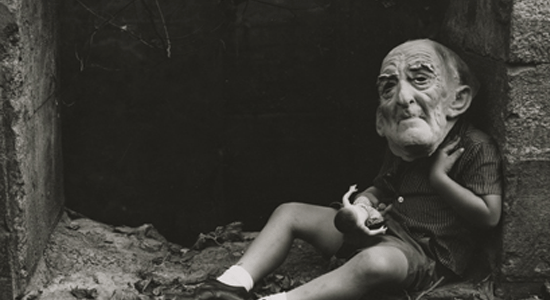It’s one thing to be a creative quadruple threat (film actor, stage actor, television actor, musician); it’s another thing entirely to excel as a quadruple threat for the better part of 43 years. From multiple Tony nominations—and wins—to starring roles on Fame and Treme, Michael Cerveris may be best known for his versatility as a thespian, but he proves just as formidable behind the mic on his long-awaited sophomore solo album, Piety. His sonic pedigree is unsurprisingly impressive, having shared the stage with the likes of the Breeders, Bob Mould, Teenage Fanclub and Frank Black. Cerveris will be guest editing magnetmagazine.com all week. Read his MAGNET Feedback.
Cerveris: I had the great good fortune to be friendly for a time with Vic Chesnutt. It was far too short a time, but I treasure every bit of it. We were introduced by Bob Mould and Kevin O’Neill when they brought Vic and Tina to see me play Hedwig at her original spiritual home in the Jane Street Hotel. I had already been a fan of Vic’s for several years, and he seemed amused and excited to be around “a theeyater guy.” Later, when he and Tina came to see me play John Wilkes Booth in Assassins, he got a big kick out of telling me I “played a real good mean somebitch.” I would go see Vic every chance I got, and that took me everywhere from the Knitting Factory in N.Y., to a show with Kristin Hersh at the Mint in L.A., to Union Chapel in London and the Barbican (where the night ended improbably with a guitar and bottle of supposedly genuine absinthe smuggled in from Eastern Europe being passed around a circle that included, me, Howe Gelb, Mark Linkous, PJ Harvey, Vic and Evan Dando, who ended the night by hogging the guitar until everyone wandered off). Every show I saw Vic play was absolute magic in a different way. The world never looked quite the same when you headed home from a Vic Chesnutt show.
After years of crossing paths and talking about touring together, we finally hit on the idea of trying to make something together for the stage. We didn’t know quite what it would be, but what we agreed on for sure was that it should have puppets. That was part of the last conversation we ever had, backstage at Bowery Ballroom two months before he was gone.
I had brought my friend Les Waters to see Vic that night. He was a director I had just had a great time working with, who was then getting ready to take over the Actors Theatre of Louisville. I had a feeling Les was going to like Vic a lot. And I was right. He was transfixed through the whole show, and we talked about it and Vic for a while afterwards. That was when he asked me if I’d ever heard of a photographer named Ralph Eugene Meatyard. I confessed my ignorance, but we agreed I’d make him a mix tape of Vic’s songs and he would send me a book of Meatyard’s photographs. Once it arrived, I realized why he sent it.
Meatyard was born in 1925 in Normal, Ill. After attending Williams College, he married and moved to Lexington, Ky., to continue his trade as an optician. Upon the birth of his son, he bought a camera to take pictures of his boy and quickly became an experimental photographer, creating a body of surreal, intriguing pictures combining commonplace elements and everyday settings in ways that rendered objects and places and people unrecognizable at the same time they feel familiar, like some half remembered dream.
Some of his most fascinating early works involve children and adults wearing masks. And his Family Album Of Lucybelle Crater is a mind-boggling creation—a series of 64 images featuring his wife, Madelyn, in a rubber Old Crone mask paired with a different friend or relative wearing a transparent mask. The name Lucybelle was derived from Lucynell, a character in Flannery O’Connor’s story The Life You Save May Be Your Own. Like O’Connor’s stories, Meatyard’s photographs get under your skin and constantly remind you that you can’t just take them at surface value. They are at once beautiful and grotesque, haunting and hilarious. All things that you could say about listening to Vic Chesnutt.
Vic and Meatyard both died prematurely, Vic at 45 and Meatyard at 46. There is something both childlike and ancient, perpetually young and deeply mortal, in what they both left behind at far too young an age. It’s something that you can’t put aside once it’s gotten in through your ears or your eyes. It’s innocence found and lost in the same place.
Someday Les and I plan to make a theater piece somehow using Vic’s music and Meatyard’s images. Neither one of us quite knows what it will be, but it seems likely there will be children in old-men masks.
And, of course, puppets.
Video after the jump.







